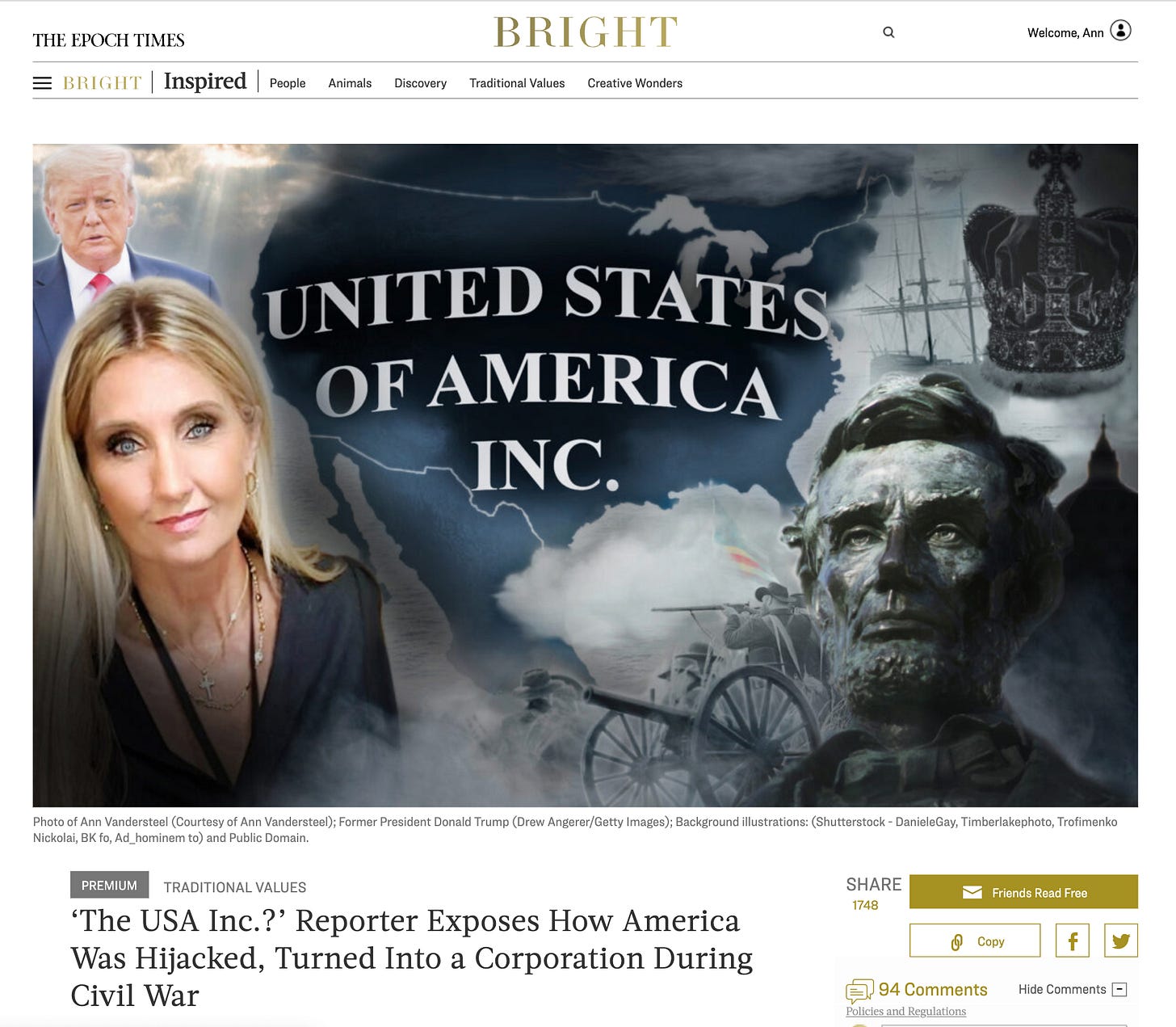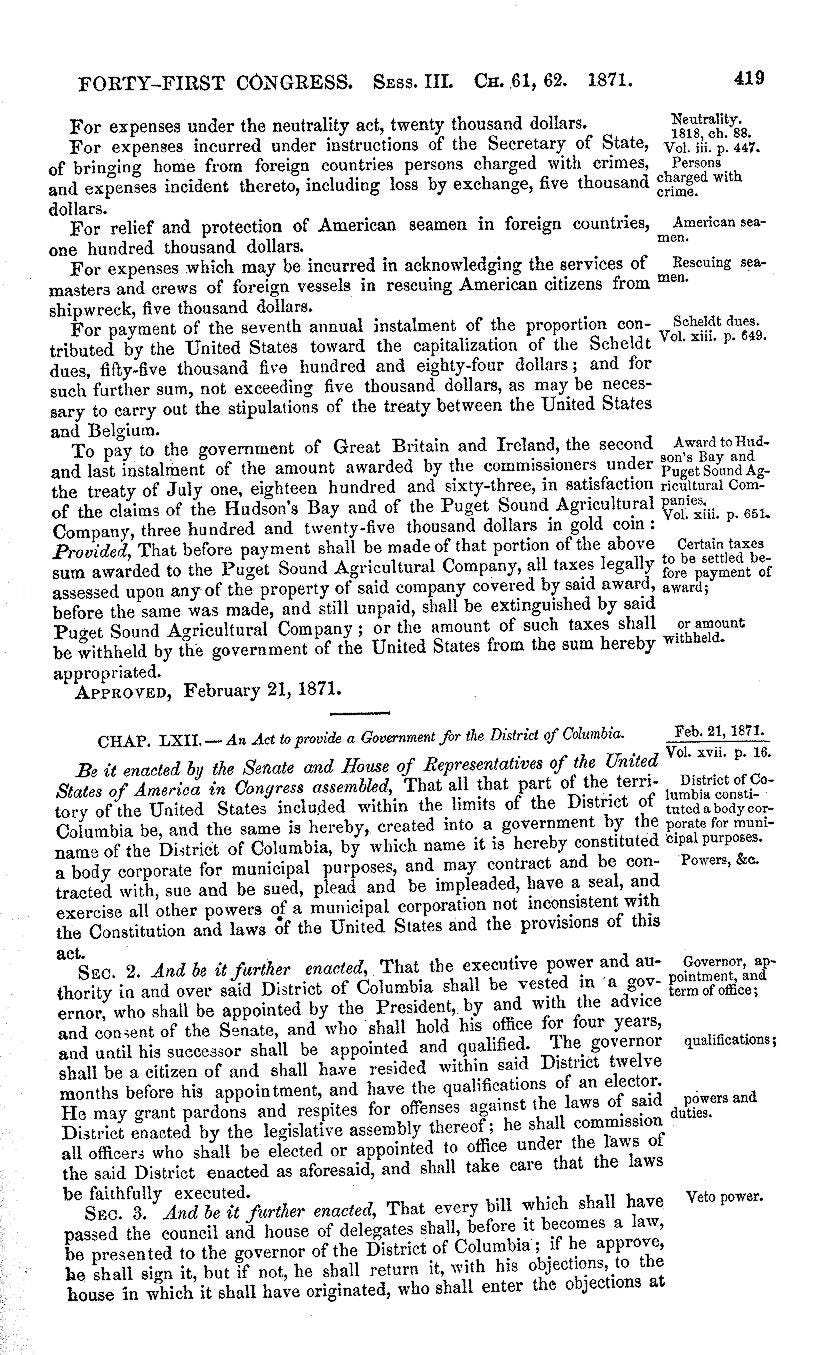STATE NATIONAL GOES MAINSTREAM
William Wing's Epoch Times dives into the real history of the united States of America
The Founding Fathers would be rolling in their graves to see the state of our nation today.
They built a republic where God is above all and where the people, created in His image, are sovereign. The people in turn created their government to serve under them; it was to be small, frugal, and limited—as we would expect our contractor to be. Looking at today’s sprawling administrative state overreach though—with vaccine mandates, endless spending, and leaders who think they are God—something doesn’t jive.
So what happened?
The answer is sequestered but simple: the republic was colonized by commercial law. This obscure fact was swept under the rug and kept shuttered in the dark for over 150 years. Yet, a burgeoning subset of Americans is uncovering this controversial chapter of American history, while also reclaiming their freedom by readjusting their status from “U.S. citizen” to “state national.” The status of state national is both old and new. Now, it denotes one who owes allegiance to the state they inhabit. But it also harks back to what the Founding Fathers envisioned a sovereign people to be.
Today, state nationals have been revealing a hidden history: In short, the British never lost the Revolutionary War; they just deployed corporatocracy. The powers of Europe bid their time: the spat between the Hamiltonian Federalists and Jeffersonian Anti-Federalists was merely an entrée for a grand usurpation that began during the Civil War. Through legal chicanery, agents of the Crown managed to recast Americans as British subjects lost at sea. America was hijacked by commercial law and became the “United States of America Inc.”
It sounds far-fetched, but one state national, Ann Vandersteel, 55, a reporter and chairwoman of the Zelenko Freedom Foundation, shared her experience after reclaiming her freedom. In 2021, she got a call from former congressional candidate Bobby Lawrence, a state national guru, who laid out said history and supplied her with her freedom bundle, the legal documentation she needed to readjust her status. She dove in and spent a year verifying and cutting through red tape, before emerging a free woman on the other shore. She shared some of her journey with The Epoch Times.
Hijacked by a Corporation?
“It was the 14th Amendment that made us citizens of a federal government that became a corporation,” Vandersteel said. “That’s where they stole it. That’s really the big hijack—and of course, the Civil War had problems.”
Ratified in 1868, the 14th Amendment declares in plain English that states shall not abridge the privileges of U.S. federal government citizens. This overtly abridges state government sovereignty, and slyly employs the word “privilege” to substitute “right” (as in natural right), implying that government may retract those privileges from citizens who misbehave, irrespective of their constitutional rights. Section 1. of the 14th Amendment reads as follows:
All persons born or naturalized in the United States and subject to the jurisdiction thereof are citizens of the United States and of the state wherein they reside. No State shall make or enforce any law which shall abridge the privileges or immunities of citizens of the United States; nor shall any State deprive any person of life, liberty, or property, without due process of law; nor deny to any person within its jurisdiction the equal protection of the laws.
After the Civil War bankrupted the United States confederate trade union, a corporation was formed to replace it. “They incorporated the 10 square miles around Washington D.C.,” Vandersteel said. “After that corporation … you became a municipal servant to the corporation of D.C.” During the Forty-First Congress, the Columbia Organic Act of 1871 openly states the fact:
Be it enacted by the Senate and House of Representatives of the United States of America in Congress assembled, That all that part of the territory of the United States included within the limits of the District of Columbia be, and the same is hereby, created into a government by the name of the District of Columbia, by which name it is hereby constituted a body corporate for municipal purposes, and may contract and be contracted with, sue and be sued, plead and be impleaded, have a seal, and execute all other powers of a municipal corporation not inconsistent with the Constitution and laws of the United States and the provisions of this act.
[Image 455 of U.S. Statutes at Large, Volume 16 (1869-1871), 41st Congress. U.S. Statutes at Large, Volume 16 (1869-1871), 41st Congress. Library of Congress. (Public Domain)]
This was followed by the rollout of a vast commercial law overlay extending well beyond the District of Columbia to govern the entire nation, replacing and nullifying what the Founding Fathers established. It did much more than that also, but to unpack this colonization we must first understand jurisdictions of land and sea.
Privateers On the Land: A War Over Legal Jurisdiction
The bedrock of American law is common law. It underpins the Constitution and our God-given rights, tracing its roots to the Bible. English common law germinated in the local customs of early Europe as a dispersed hodgepodge of traditions that were compiled by 9th-century Anglo-Saxon King Alfred the Great in his “Doom Book.” It was later echoed in the Magna Carta and was eventually systematized by Sir William Blackstone, whose voluminous commentaries became the American legal system. Under this system, people are living souls with God-given rights.
On the other hand, commercial law, which predates the Bible, is Roman civil law. It once governed commerce on the high seas and therefore is also called admiralty, maritime, or simply sea law. It was Emperor Justinian who employed duplicitous language to cast real things as legal fictions (corporations), allowing captains to incorporate their vessels and not be held liable if their cargoes were pirated on the high seas. Corporations are ubiquitous today; legal fictions overlay businesses, property, and even people. Unlike real things, corporations can be dissolved with the stroke of a pen. They were quite literally called “soulless vessels.”
So, like privateers colonizing the land, admiralty law inundated and unseated common law in America. Common law Article III courts were replaced by admiralty law Article I courts, and a comprehensive commercial overlay captured everything: from the congress to the courts, from motor vehicles to the people themselves. But how could a people become corporations? The birth certificate registry was introduced.
“From the time you’re born through a birth canal, you’re recognized by the government powers that be that you have been in a body of water and therefore subject to admiralty law when your parents are unwittingly and unknowingly, tacitly giving you to the state by awarding you through a birth certificate and a social security number,” Vandersteel told the newspaper. “Those are tacit agreements that you’ve now contracted. You’ve created a vessel for your living being child, with your all-caps birth certificate and your social security contract.”
Before the birth certificate was instituted in 1900, parents simply wrote their children’s names in the family Bible and it was law. Now, right from birth, people are claimed by admiralty law jurisdiction; our silence equals tacit agreement. The birth certificate and other contracts make us subject to the corporation’s policies—their mandates, codes, and ordinances—often at the expense of our constitutional rights.
This was followed by a slew of debt slavery instruments being implemented, some of which include the Federal Reserve Act (1913), the Social Security Act (1935), the Bretton Woods Agreement (1944), and the removal of the United States from the gold standard (1971). We went from having a republic under God to one ruled by global bankers and corruption, the opposite of what the Founding Fathers would have thought “de jure.”
As admiralty law is so ancient, it permeates our language, often miring us in a maze of jurisdictions outside our awareness. Vandersteel shared just a trifle to illustrate this colonization:
The word “person” overlays the word “people.” A person is legal fiction, denoting a dead corporate vessel; a people is a living man, woman, or child with a soul. Person stems from maritime law: on a ship, there were roles such as captain, first mate, boatswain’s mate—and there was “purser on land,” who held the purse, went ashore, and paid the ship’s bills. Purser on land became person; it is a corporation. It was the 14th Amendment that introduced this diction into the Bill of Rights, replacing the word “people.”
The use of all-caps typeface, as in THE UNITED STATES OF AMERICA, or THE WHITE HOUSE, denotes a corporation. This is why the names on birth certificates (and headstones) are in big letters.
There is much to say about the American flag. Here we will mention only that the gold admiralty fringe stitched onto some American flags and the eagle device atop the flag pole represent the captured republic. The constitutional American flag is unadorned.
A “motor vehicle” is legal fiction that overlays an “automobile.” A motor vehicle is partially owned by the state; drivers merely receive a certificate of ownership, making them subject to codes of commerce. Automobiles denote something that is private property.
“Police” stems from the term “policy enforcement” or “policy corporate enforcement” and has nothing to do with enforcing the law and everything to do with enforcing codes, mandates, and ordinances. A “sheriff” is the de jure law enforcement agent of the people, who enforces the law of the land.
The overlay is endless.
Commercial law colonization is so thorough that to find freedom would require a paradigm shift that many would find jarring—like hitting a brick wall, perhaps. There are pitfalls for the unwary (therefore, this is not legal advice). State nationals and similar movements have been labeled “paper terrorists” by certain agencies. Yet many are seeing the movement build steam. There are even whispers of a certain former Republican president being onboard.
Charting a Course for Land and Common Law
Like Odysseus, state nationals have charted a legal voyage home. They have wrought a proven process to reclaim sovereignty. Upon receiving her freedom bundle, Vandersteel completed an “affidavit of truth,” airing her grievances against the current regime and declaring her contracts null and void—just as the Founding Fathers aired their grievances to the King of England and declared independence. “I recognize the construct of fraud: case law 1878 United States vs Throckmorton. Fraud vitiates everything,” said Vandersteel. “I’m calling out the fraud, saying I’m not participating in the fraud.”
This construct of fraud carries over to the 14th Amendment itself, which was ratified without proper consent from the necessary two-thirds of the states. “People were under duress after the Civil War. They had literally legislatures in the southern states that were told you must sign this or there’s no admittance back to the union,” she said. “Instead of even giving them an option to think about it, they replaced them at the state level.” This means there’s not only a legal path to freedom on an individual citizen level but also a national level. Given the opportunity, Vandersteel said she would gladly advise our Republican leaders, such as DeSantis and Trump, of this little factoid.

If Trump returns in 2024, she might also advise him to unincorporate D.C., and revoke the Federal Reserve Act while he’s at it. That would go a long way toward restoring the law of the land as the Founding Fathers established it.
Last summer, Vandersteel received her passport recognizing her state national status. She now has limited diplomatic immunity, and no longer pays income tax. “I didn’t even file,” she said. “Because if I send them any paperwork, even a notice to say I’m extending or whatever that’s like a tacit agreement to contract, and the IRS is a United Nations chartered foreign entity.” For Vandersteel, though, it’s not about paying taxes. It’s about living as God intended.
The movement has seen a boon. Thousands of Americans are attending Lawrence’s seminars across the country. Meanwhile, top echelons of the MAGA movement have hinted at allegiance with state nationals. Both Vandersteel and Lawrence point to several instances of Donald J. Trump signaling his support, such as in his statement at CPAC 2021 in Texas:
“We will take back that glorious White House that sits so majestically in our nation’s capital,” he said (at 1:30.00). “Beautiful White House—that’s small letters—White House … and it is the most beautiful house of all.” Of course, “small letters” would denote lowercase typeface, signaling that the corporation will be dissolved.
[President Donald Trump speaks during a briefing on the coronavirus pandemic in the press briefing room of the White House on March 26, 2020, in Washington, DC. (Drew Angerer/Getty Images)]
Vandersteel also mentioned what Trump said at a Rally in Wilmington, North Carolina (at 7:55), in September: “Think of it, Ivanka—Ivanka is a very good person. Don Jr., he’s a good person. Eric is a good people.” In other words, one of his sons is no longer a dead corporate vessel subject to admiralty law but a living man under God.
While critics might call this “misinformation” designed to rouse QAnon conspiracy theorists, state nationals aren’t so sure, though there’s one way to find out. Vandersteel had been speaking at the ReAwaken America Tours alongside Eric Trump, General Michael T. Flynn, and the late Dr. Vladimir Zelenko. Will Eric let the cat out?
“When I see Eric next week at Pennsylvania in Mannheim speaking there, I’m going to ask them about it,” she said. “I’m going to have that clip cued up on my phone and go, ‘What did your dad mean by this?’ and see what he says. I’m going to try and read his face.”
Share your stories with us at emg.inspired@epochtimes.com, and continue to get your daily dose of inspiration by signing up for the Inspired newsletter at TheEpochTimes.com/newsletter
EDITOR AND WRITER
Following
Michael Wing is a writer and editor based in Calgary, Canada, where he was born and educated in the arts. He writes mainly on culture, human interest, and trending news.








